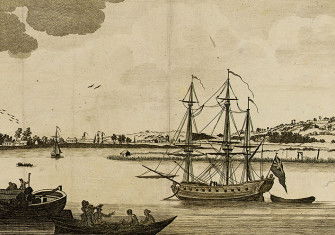Captain Kidd: Privateer, Pirate and Agent of Empire?
The trial of Captain William Kidd raised uncomfortable questions for the state about the pirate’s role in the consolidation of England’s early overseas empire.

When Captain William Kidd was executed for murder and piracy on May 23rd, 1701, he died defiantly proclaiming his innocence. He repeated his claim that he had been the innocent dupe of ‘others who knew better, and made me the tool of their ambition and avarice’. The question of Captain Kidd’s guilt or innocence has been a matter of historical debate ever since and the number of books published on the pirate are testimony to the popularity of the subject. However, in seeking to untangle the enigma of Kidd’s activities, historians have probably underestimated the stage on which the hapless pirate’s story unfolded.







